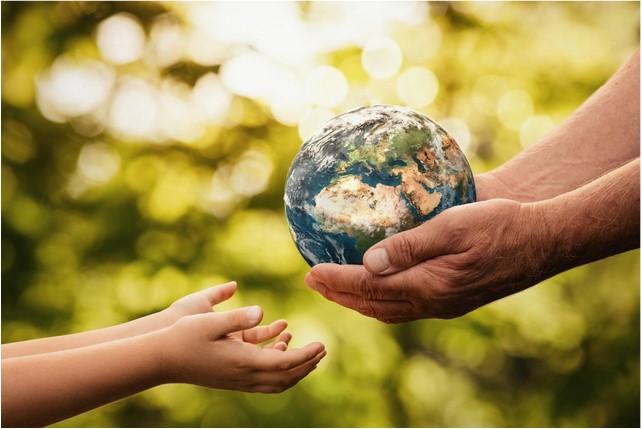Earth Day is the world’s largest collective moment to celebrate and promote the conservation of our planet. First celebrated in 1970, this event, initiated by US Senator Gaylord Nelson and supported by President John Fitzgerald Kennedy, involves up to one billion people in 192 countries around the world each year.
The United Nations celebrates Earth Day every year on 22 April, one month and two days after the vernal equinox. This day began with the aim of highlighting the importance of conserving the Earth’s natural resources and has transformed over time from an academic movement to a global educational and informational event.
A turning point came on 22 April 1970, when 20 million US citizens mobilised in a demonstration in defence of the Earth. Since then, Earth Day has become a symbol of commitment to environmental protection, uniting people of different ethnic, geographic, and socio-economic backgrounds.
The day provides an opportunity to reflect on the environmental challenges we face and to inspire concrete actions to address them by promoting waste collection days and raising awareness of solutions such as recycling materials, conserving natural resources, banning harmful chemicals and protecting habitats.
Since that distant 1970, Earth Day has catalysed environmental initiatives around the world, helping to raise public awareness and influencing crucial policy decisions: in 1992, for example, it paved the way for the first United Nations Conference on Environment and Development (UNCED)in Rio de Janeiro.
In the years since, thanks mainly to the spread of the Web, Earth Day has continued to grow, involving more and more people and equipping itself with ever more powerful communication tools, culminating in the celebration of its 20th anniversary in 2000 with powerful symbolic gestures, such as a historic expedition of mountaineers to Mount Everest, broadcast worldwide via satellite, to clean up waste left on its slopes: the initiative allowed more than two tonnes of waste left by previous missions to be transported down the river.
Today, participation exceeds one billion people, demonstrating the commitment of a “Green Generation” to a sustainable and greener future and to teaching future generations the importance of environmental protection.
PlasticFree and growing environmental action
Among the more than 600 initiatives and countless realities that have been launched throughout Italy, PlasticFreestands out, a non-profit organisation founded in 2019 that is actively engaged in raising awareness and promoting practices aimed at reducing the use of plastic and combating the pollution it causes, both locally and globally.
PlasticFree is engaged in a variety of initiatives, such as awareness-raising campaigns, educational projects in schools, beach litter picks and lobbying initiatives to promote more sustainable policies regarding plastic use. The main objective is to promote a cultural change leading to a more conscious and responsible use of plastic, promoting sustainable alternatives, and encouraging the reduction, reuse and recycling of materials.
The strength of this non-profit organisation lies in involving local communities, institutions, and companies, working in a network to create a positive impact on the environment and public health, fighting against plastic pollution and promoting a more sustainable lifestyle.
Thanks to the presence of local contact persons, clean-up activities take place throughout the year, even in small villages, depending on the availability of volunteers. Since November 2019, appointments have grown exponentially, reaching more than 200 per month. n recent months, 5,836 have been organised, involving 250,000 volunteers, and removing 3,715,439 kg of plastic from cities, beaches, parks, and rivers. On the eve of Earth Day, PlasticFree organised a series of national events, bringing together volunteers on the same days.
PlasticFree’s commitment to schools
The association’s commitment also extends to the world of schools – to date, it has 2,775 appointments in schools and 221,190 students have been made aware of the issue – where it works to raise awareness among young people and transform schools into plastic-free places through personalised interventions for each age group, encouraging recycling practices, the use of alternatives to plastic and respect for the environment, and the installation of water purification plants, thus reducing the use of plastic bottles and promoting a more sustainable consumption of water resources.
Saving sea turtles and engaging with business
Thanks to its great success, despite having been born in the difficult times of the SARS-Covid-19 pandemic, PlasticFree has broadened its horizons, collaborating with companies of all sizes, and creating tailor-made projects for corporate sustainability that have been joined by major national and international brands such as PayPal, Microsoft, Volkswagen, Porsche, Nexi… And not only that: as of 10 June 2020, it has made a commitment to save sea turtles, which, threatened every year by human negligence, lose more than 40,000 specimens. Thanks to spontaneous donations, it rescues those in distress, cares for them and rehabilitates them by returning them to the sea.
All of the association’s work is regularly documented on its website thanks to the testimonials of its members, and the promise made by founder Luca De Gaetano at the annual awards ceremony for the most virtuous “Plastic-free Municipalities” was to go beyond Italy’s borders: “In two years, we have gone from 49 to 111 Plastic-free Municipalities, a sign that the commitment of local administrations, supported by our volunteers and members, is becoming more and more widespread. Next year, we will make it easier for municipalities to participate by digitising procedures. But the big challenge ahead of us is internationalisation: we will cross national borders with the aim, in the coming years, of raising awareness among up to one billion people, starting in Europe.
From the local to the global, a tangible sign of how we can work together for a cleaner, healthier, and more sustainable world in which Earth Day can become in the future a celebration of victory over the global threat.


